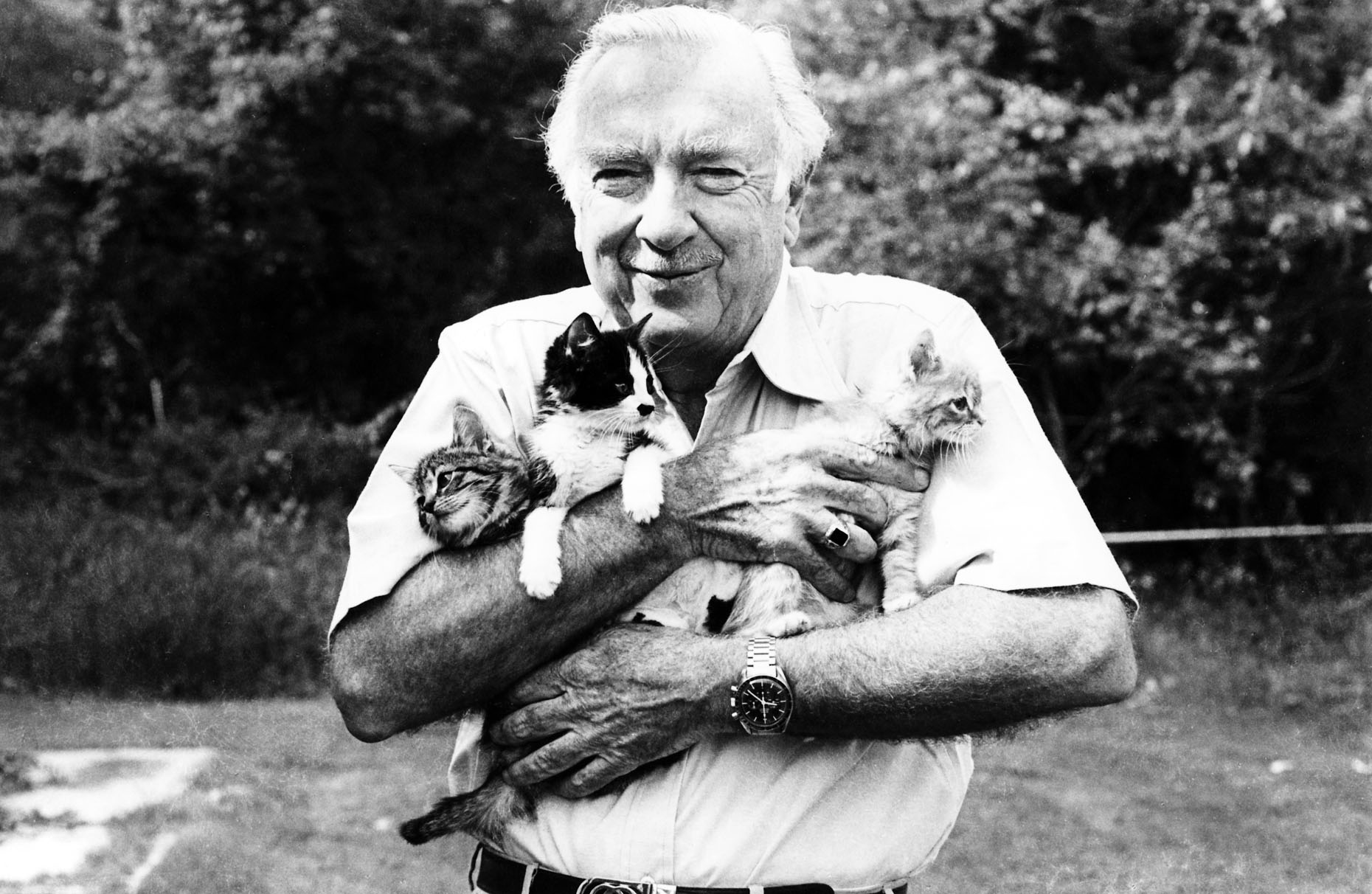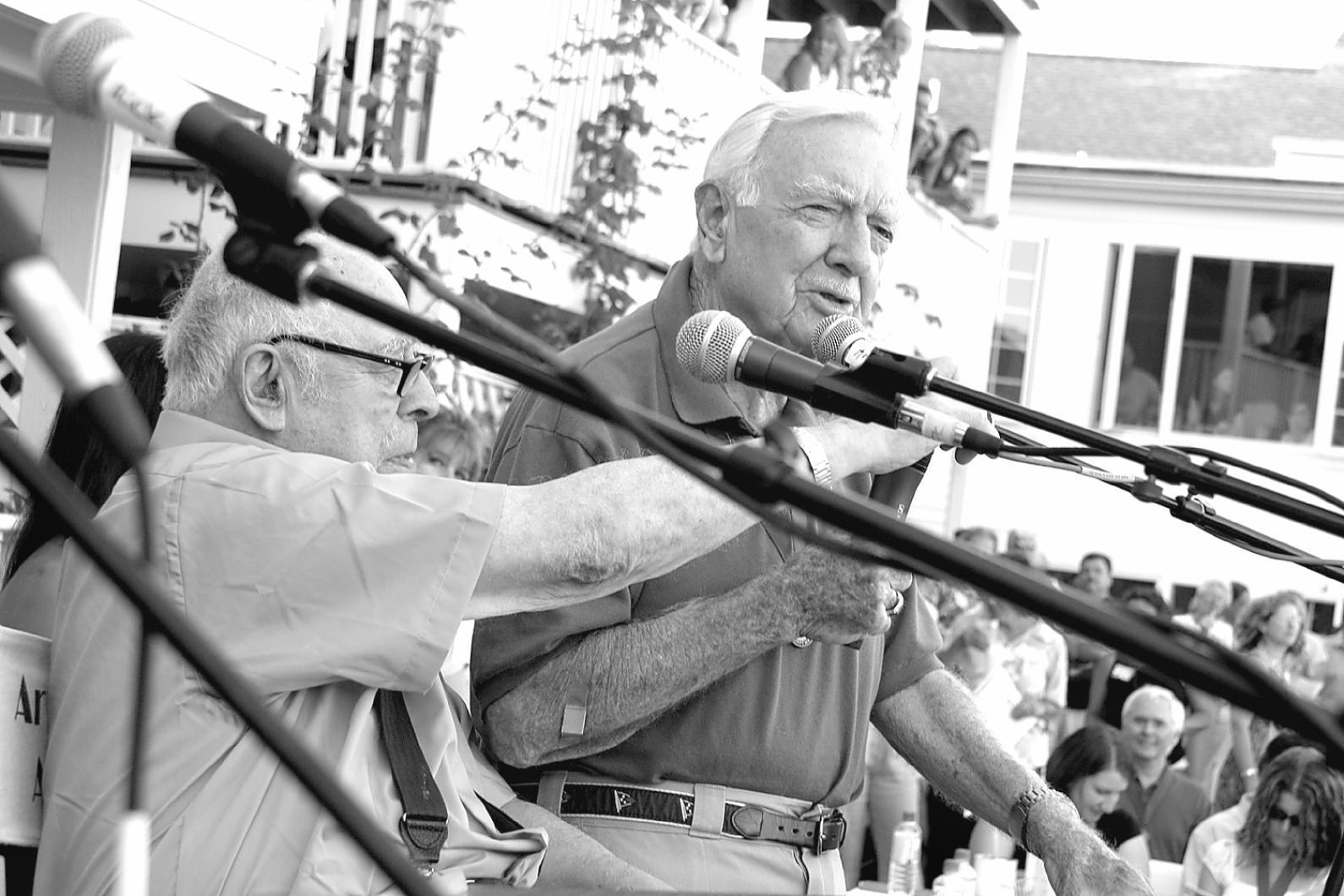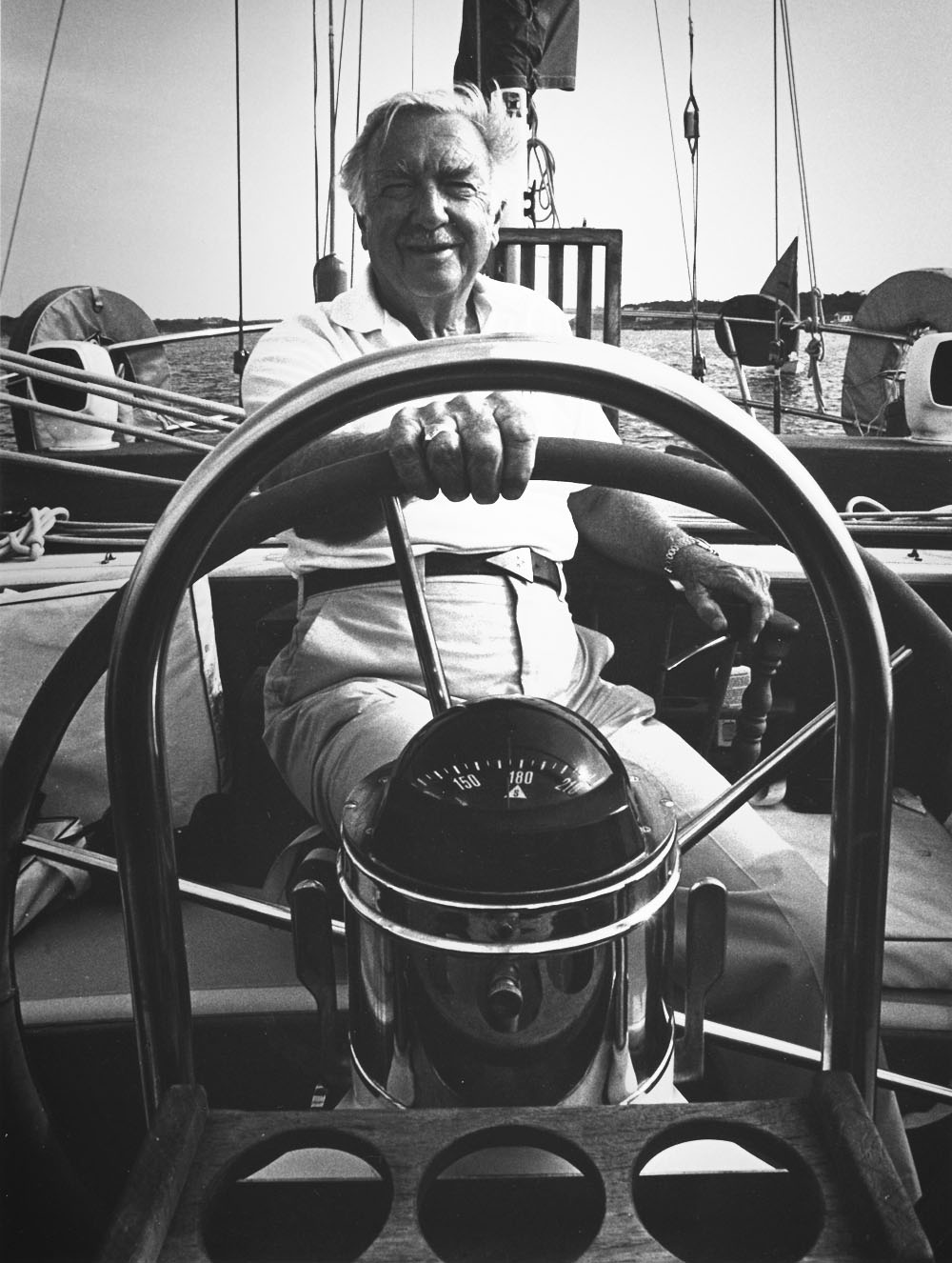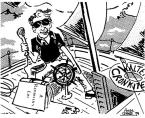Walter Cronkite, CBS Evening News anchorman from 1962 to 1981, and a devoted Edgartown seasonal resident for more than three decades, died on Friday at his home in New York after a lengthy illness. He was 92.
At the time of his 1981 retirement, Mr. Cronkite was heralded as the most influential reporter in the American media by the late columnist James (Scotty) Reston of the New York Times and then-Gazette publisher. Lauding his television colleague, newspaperman Reston commented that Mr. Cronkite’s news program had more viewers than all the nation’s newspapers combined had readers. Remarking on Mr. Cronkite’s warm, mellow voice that was so familiar in so many living rooms at dinnertime, Mr. Reston said it was a voice that made disasters sound reasonable and almost comfortable.
Since Mr. Cronkite’s passing, he has been similarly lauded by fellow newsmen and women as the consummate journalist — the best of his day. He has been praised for his outspoken and pessimistic 1968 assessment of the war in Viet Nan made after a trip there, and its effect on the national political scene.
“It seems now more certain than ever that the bloody experience of Viet Nam is to end in a stalemate,” he said on the CBS Evening News, and President Johnson, hearing it, reportedly commented: “If I’ve lost Cronkite, I’ve lost middle America.” Five weeks later, President Johnson announced that he would not run again.
On the Island, however, Mr. Cronkite is recalled as a dedicated yachtsman and an avid tennis player, the provider of the text for three books of oil and watercolor paintings of this nation’s coast by Edgartown artist Ray Ellis, a generous donor of his time and his name to such causes as Martha’s Vineyard Community Services, Sail Martha’s Vineyard, the 1988 construction of the animal shelter in Edgartown, the Sheriff’s Meadow Foundation, the Martha’s Vineyard Hospital and the Martha’s Vineyard Historical Society. He fought successfully to prevent the closing of the Menemsha Coast Guard Station in the 1980s. In 2000, he was elected Community Hero by the Stone Soup Foundation in gratitude for his having been one of the most actively involved seasonal residents on the Vineyard.
He is also remembered for his concern over the increasing “Cape Codification” of the tranquil Vineyard he so loved. “I see Main street in Edgartown turning into Highway 28.” he sadly told a reporter for the Cape Cod Standard Times in 1985. And in 1990, he wrote in Peter Simon’s On the Vineyard II of how much Edgartown had changed over the years he had known it.
“It is unfortunately no longer the little country village it once was. While I still love it, it is now a resort.... And the traffic now in July and August has become intolerable.” A devotee of taking visitors on an all-Island tour to Menemsha and Aquinnah (Gay Head), he found that journey increasingly wearying because of traffic in recent years.
Mr. Cronkite was a member of the Edgartown Yacht Club, the Chappaquiddick Beach Club and the Edgartown Reading Room. Although it was when they were at their New York city home that the Cronkites did most of their dining out, when they did go out with guests on the Vineyard, it tended to be either to the Edgartown Yacht Club or l’étoile and its successor, The Terrace, at the Charlotte Inn. For more casual evenings out, MR. Cronkite often chose Lola’s at the Island Country Club in Oak Bluffs. But most of the time, Island entertaining was done right at home where Mr. Cronkite could look contentedly down from the back porch at his boat on Katama Bay waters below. His guests might be well-known journalist friends from New York or an Island resident such as Edgartown Police Chief Paul Condlin.
“He really was Everyman,” a longtime Vineyard friend says. “He was just the way he always sounded when you heard him on TV.”
Oak Bluffs gardener Lisa Shanor echoes that comment. “He just came out of the house and talked to me while I worked on the property, and wanted to know everything that I knew about roses. He wasn’t stuffy or pretentious or anything like that.”

His daughter, Kathy, remembers the joy that he took in everything and everyone about him.
“He gave me and my brother and sister an ability to appreciate both the small things and the big things around us. He appreciated everyone and everything. He had tremendous intellectual curiosity, of course, but he was always the hometown guy from St. Joe, Missouri.”
He once told a reporter that on the Island he spent his mornings, starting at 8, on the Edgartown Yacht Club tennis courts and his afternoons sailing. His Edgartown tennis companions were likely to be Dr. James A. Wolfe, Mr. Ellis, Marshall Cohan, Warren Whitley, Norris Darrell, Anthony O’Connor and Paul MacCowatt. Other occasional players with him in Edgartown were Scotty Reston and Richard Reston, present publisher of the Vineyard Gazette. Never tiring of tennis, in Vineyard Haven he played with fellow CBS newsman Mike Wallace and the late Art Buchwald on the Vineyard Haven Yacht Club courts. But a few years ago, a torn Achilles tendon that failed to heal put an end to his tennis playing. He also was told after that that he should not swim, and swimming had been one of his great Island pastimes. Sometimes he would swim off his boat when it was anchored off Cape Pogue for a picnic, or he would simply walk down the rose-mallow-lined path to his dock and swim in the bay.
If he were spending a particularly laid-back day, he and his wife, Betsy, might go for lunch or dinner or simply a drink at the Edgartown Reading Room where, at lunchtime, he favored “soup” as his libation, a nonalcoholic drink of beef bouillon over ice, or Scotch in the evening. After a period simply as a summer member there, he became a full-fledged jacket member of the Reading Room.
One of the most memorable of his Edgartown Yacht Club experiences was being able to host a 100th birthday party there for his mother, Helen Fritsche Cronkite, in 1992. When the band struck up “Bill Bailey, Won’t You Please Come Home,” she asked her son to dance with her. Mr. Cronkite always enjoyed music and was the honorary chairman of the Pops by the Sea Concert on the Hyannis Village Green in 1990. During the concert, he delightedly accepted an invitation to conduct the Boston Pops Esplanade Orchestra in a rendition of the Washington Post March. He also had been a guest conductor at the Mormon Tabernacle and with the New York Pops.
At the Vineyard, he kept his boats at the dock below his Green Hollow house. There were a series of yachts — seven of them — in the course of time. The first of them was a ketch and after that they were yawls. All were named Wyntje after the first woman in the New Amsterdam colony to marry a Cronkite (although the name at that time was not Cronkite). There was also a second-hand Boston Whaler named Pequot in the Cronkite fleet, and Mr. Cronkite shared a 19-foot Herreshoff with David Moore that they sometimes raced.
Born in St. Joseph, Mo. Nov. 4, 1916, a son of Walter Leland Cronkite Sr., a dentist, and the former Helen Lena Fritsche, he did not come to a love of boating until he was a young father in the East, and he and his wife were summering with their children at Gipsy Trail, N.Y. where there was a lake. He bought a small sailboat for the children. At that time, his principal sporting interest was in auto racing and rallying, but CBS found auto racing to dangerous for their star newsman, so he chose sailing as his substitute sport. The Vineyard, which he discovered when he was cruising local waters in the 1960s, seemed the ideal place to pursue sailing. For two years in the early 1970s, he rented the house of Dr. Madeleine Brown at Starbuck’s Neck. From it, the family watched the filming of Jaws and the Cronkite son, Chip, raced out in the Whaler to assist one day when the film crew seemed to be in trouble. When Mr. Cronkite told a relative where he had summered, he was told he was distantly related to the Edgartown Nortons.
In 1974 the Cronkites bought the 1929 Dutch Colonial gambrel-roofed Wuerth house overlooking Katama Bay at Green Hollow. It is situated very close to the site where, legend has it, the first white men on the Vineyard spent the winter of 1632. On the property, he and his wife kept a simple garden — mainly of roses and hydrangeas, and a wildflower garden that Chip had planted. Animal-lover that Mr. Cronkite was, he had Mike Joyce of Edgartown build a giant enclosure for the two cats, Keysa and Blackie, that he got as a gift for his wife at the animal shelter in Edgartown some years ago. Before the cats, there had been a springer spaniel, Buzzy.
Green Hollow was the perfect spot for the Midwesterner who had become enamored of the sea.
“The inland man or woman, having not grown up on the water, is more intrigued by the water than someone who has had it available to them all of their lives,” he told a Gazette reporter in 1983. Afternoons when he was not sailing, he was quite content to simply sit on his porch above the bay and watch the boats below sail by.
But a sail, of course, was the best of all possible worlds. It might be to Nantucket or down the coast of Maine or to Newport, R.I. or Stonington, Conn. For most of his life, he captained his 50- and 60-foot yachts himself. Some years ago, Nancy Weaver of Vineyard Haven, wife of Capt. David Dandridge of the Steamship Authority, who calibrates compasses on request, was startled to hear a familiar voice.
“This is Walter Cronkite,” the yachtsman’s voice on the other end of the line said in those unmistakable tones. It turned out it was Mr. Cronkite seeking her husband’s help with his compass. Only in recent years, after his problem with his Achilles tendon, did Mr. Cronkite hire a skipper for his Wyntjes, but he always took the wheel whenever he could.
Although poor health had forced him to he give up sailing, there was still a Wyntje in his life at the time of his death — a 30-foot motorboat that he kept at the City Island Yacht Club in New York where he spent his winters.
After his early years in Missouri, Walter Cronkite’s family moved to Houston, Tex., when he was a teenager and it was there that he first became enamored of journalism when he was hired as a copy boy and cub reporter at the Houston Post. When college years approached, he enrolled at the University of Texas. For two years, he studied politics and journalism there and worked on the university paper, but he also wrote for The Houston Press and left the university in 1935 for a full-time job with that paper. On a visit to Kansas City, Mo., he got his first taste of broadcasting when he was hired by radio station KCMO to read and broadcast football news. It was there that he met his future wife, Mary Elizabeth Maxwell, an advertising writer. They were married in 1940 and soon thereafter she became the women’s editor of the Kansas City Post-Journal.
Mr. Cronkite was fired from the radio station in 1939 in a dispute over journalism practices he considered questionable. He then was hired by the United Press news service, for which he reported from Houston, Dallas, El Paso and Kansas City. With United Press, he became a war correspondent at the outbreak of World War II, covering American troop activity in North Africa, the invasion of Normandy and the Battle of the Bulge.
After the war, Mr. Cronkite covered the Nuremberg trials from 1946 to 1948 and later reported from Moscow for a number of Midwestern radio stations. In 1950, Edward R. Murrow enticed him into joining CBS to develop a news station in Washington. Two years later, he was selected to lead the CBS coverage of the Democratic and Republican national conventions. It was then, according to the New York Times, that the term “anchor” was first used to designate a chief announcer’s job — the job Mr. Cronkite had. It was surely a term that nautical Walter Cronkite savored. From then on, Mr. Cronkite anchored every national convention until 1980, except that of 1964.
In 1961, Mr. Cronkite became senior correspondent for CBS and a year later the station’s managing editor. In that capacity, he lengthened the 15-minute nightly CBS news broadcast to half an hour in 1963, ending it always with: “And that’s the way it is.” This became his signature sign-off. It was at that time, too, that his broadcast became CBS Evening News With Walter Cronkite.
In the course of his career, Mr. Cronkite told a San Francisco Chronicle reporter in 2004, he had encountered every President beginning with Herbert Hoover, whom he met as an old man retired to New York’s Waldorf Astoria Hotel. He described Jimmy Carter as the smartest president he had known “and the only one who bothered to actually read the lengthy bills passed by Congress.” He remembered exchanging dirty jokes with President Reagan and always had pleasant relations with President Eisenhower, he said. In an earlier Cape Cod Times interview, he recalled the most important stories of his 30 journalistic years. They were the landing on the moon and the exploration of space, atomic energy and the computer, pollution and television.
Although he retired from CBS in 1981, he continued in the public eye and was the host of Walter Cronkite’s Universe, a CBS science series that ran for two years in the 1980s. He also was named a CBS special correspondent and for 10 years he was on the CBS board.
Always interested in space travel, he enthusiastically had covered Neil Armstrong’s 1969 moon landing and in 1998 when Sen. John Glenn went back into space on the shuttle Discovery, he covered the event for CNN. He also, in “retirement,” did 60 documentaries, was host of the Kennedy Center Honors and wrote his memoir, A Reporter’s Life.
Mr. Cronkite was the recipient of many honors including Emmy Awards, a Peabody and the Presidential Medal of Freedom..
Mr. Cronkite’s wife predeceased him by four years. He is survived by his son, Water Leland (Chip) Cronkite 3d, two daughters, Nancy Elizabeth Cronkite of New York and Chilmark, and Mary Kathleen Cronkite of Austin, Tex., and four grandsons. For the last several years, former opera singer Joanna Simon of New York and Edgartown, sister of singer Carly Simon and photographer Peter Simon, has been his companion.
A private funeral service is to be held Thursday at St. Bartholomew’s Church in New York city, which the Cronkites had attended when their children were small. A memorial CBS service is to be held at Alice Tully Hall at Lincoln Center at a time to be announced during the first week in August. A Vineyard memorial service will also be held at a time to be announced.







Comments (1)
Comments
Comment policy »